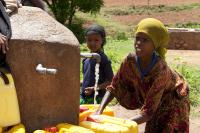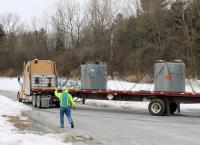-
Paper-based test to help prevent food poisoning
The foodborne bacteria Salmonella alone led to nearly 20,000 hospitalizations and almost 400 deaths in 2013. Economists estimate that the treatment of all these patients and the related productivity losses cost more than $3 billion annually. And those numbers account for just one of the fifteen pathogens responsible for most of the food poisoning cases. Scientists have developed a simple, paper-based test that could help detect pathogens hitchhiking on food before they reach store shelves, restaurants and, most importantly, our stomachs.
-
-
2010 Maryland food poisoning outbreak traced to Asian strain of seafood pathogen
V. parahaemolyticusis the most important cause of seafood poisoning in the United States. Approximately 4,500 cases occur annually in the United States, according to the Center for Disease Control and Prevention. The number of cases has risen in recent years, possibly do to the warming climate.
-
-
Protecting soldiers from emerging infectious diseases
Emerging infectious diseases that the U.S. military could encounter around the globe, particularly those found in tropical settings such as dengue, Burkholderia melioidosis, and malaria, are often difficult to distinguish by their clinical characteristics alone. Scientists from the Naval Health Research Center (NHRC) and the Defense Threat Reduction Agency (DTRA) held a two-day meeting earlier this month to discuss progress and goals for a joint biosurveillance project which aims to develop novel point of need (PON) diagnostics to identify pathogens that cause acute febrile illnesses and threaten global and public health.
-
-
Expanding use of recycled water would benefit the environment, human health
More than 1 in 9 people around the world, about 750 million, do not have access to safe, clean drinking water, and the problem is expected to worsen in step with rising greenhouse gas concentrations, population increases and climate change. Researchers found that found that recycled water has great potential for more efficient use in urban settings and to improve the overall resiliency of the water supply.
-
-
Better tracking of police homicides
Official counts of homicides by police seriously undercount incidents, according to a study, but a relatively new national data system, currently in use in thirty-two states, could be a crucial tool for gathering more comprehensive information, say the researchers.
-
-
Conditions increasing Zika virus risk present in many U.S. cities
Key factors that can combine to produce a Zika virus outbreak are expected to be present in a number of U.S. cities during peak summer months. The Aedes aegypti mosquito, which is spreading the virus in much of Latin America and the Caribbean, will likely be increasingly abundant across much of the southern and eastern United States as the weather warms, according to a new study.
-
-
Fertilizer applied to fields today will contaminate water for decades
Nitrogen fertilizer applied to farmers’ fields has been contaminating rivers and lakes and leaching into drinking water wells for more than eighty years. Dangerous nitrate levels in drinking water could persist for decades, increasing the risk for blue baby syndrome and other serious health concerns.
-
-
Water storage strategies in Sub-Sahara Africa

Direct abstraction of water from rivers through ponds and pumping devices seems the most attractive water storage option in Ethiopia. However, the funding agencies that may be interested in investing in such a storage system have to consider that better access to credit, and clear abstraction policies should be ensured.
-
-
Truck carrying toxic nuclear materials stolen in Mexico

Five Mexican states have been placed on a state of alert after a truck carrying a container of dangerous radioactive material was stolen, the Mexican Interior Ministry has said. The material could cause permanent or serious injury to a person who is in contact with it for a short time, and is fatal when exposure lasts for more than a few hours.
-
-
New heat-wave formula to help health agencies prepare for extreme temperatures
Extreme heat can pose several health risks, such as dehydration, hyperthermia, and even death, especially during sustained periods of high temperatures. However, a uniform definition of a heat wave does not exist. As a result, public health agencies may be unsure of when to activate heat alerts, cooling centers and other protective measures. Researcher has developed a uniform definition of a heat wave that may help public health agencies prepare for extreme temperatures.
-
-
Chlorine-free water tastes better, and may be healthier

Chlorinated tap water is the norm around the world, but the experiences of several European countries is that it does not have to be. The benefits of foregoing chlorine include better-tasting and, potentially, healthier water.
-
-
Hackers hold hospitals’ medical data hostage
Hackers attacked several hospitals in Germany with ransomware – locking medical files and demanding ransom payment for releasing the encrypted data. The blackmailing of hospitals by encrypting their medical file has become a growing problem around the world. In California, for example, a Hollywood hospital earlier this month had to pay about $17,000 in the digital currency bitcoins to hackers in order to regain access to medical files.
-
-
“Magic wand” to improve healthcare, cybersecurity
Wireless and mobile health technologies have great potential to improve quality and access to care, reduce costs. and improve health. But these new technologies, whether in the form of software for smartphones or specialized devices to be worn, carried or applied as needed, also pose risks if they’re not designed or configured with security and privacy in mind. Researchers have developed a digital “magic wand” to improve home healthcare and to prevent hackers from stealing your personal data.
-
-
Calif. gas well blowout caused U.S. largest methane release, study finds
The Aliso Canyon natural gas well blowout released more than 100,000 tons of the powerful greenhouse gas methane before the well was finally plugged 11 February, according to the first study of the event. The results confirm that it was the largest methane leak in U.S. history.
-
-
Texas hospitals developed first rapid tests for Zika virus

Two major Texas health centers have developed Scientists at two Texas hospitals — Texas Children’s hospital and Houston Methodist hospital – have developed what they describe as the U.S. first hospital-based, rapid test for the Zika virus. The test can yield results in a matter of hour.
-
More headlines
The long view
We Ran the C.D.C.: Kennedy Is Endangering Every American’s Health
Nine former leaders of the Centers for Disease Control and Prevention (CDC), who served as directors or acting directors under Republican and Democratic administrations, serving under presidents from Jimmy Carter to Donald Trrump, argue that HHS Secretary Roert F. Kennedy Jr. poses a clear and present danger to the health of Americans. He has placed anti-vaxxers and conspiracy theorists at top HHS positions, and he appears to be guided by a hostility to science and a belief in bizarre, unscientific approaches to public health.
